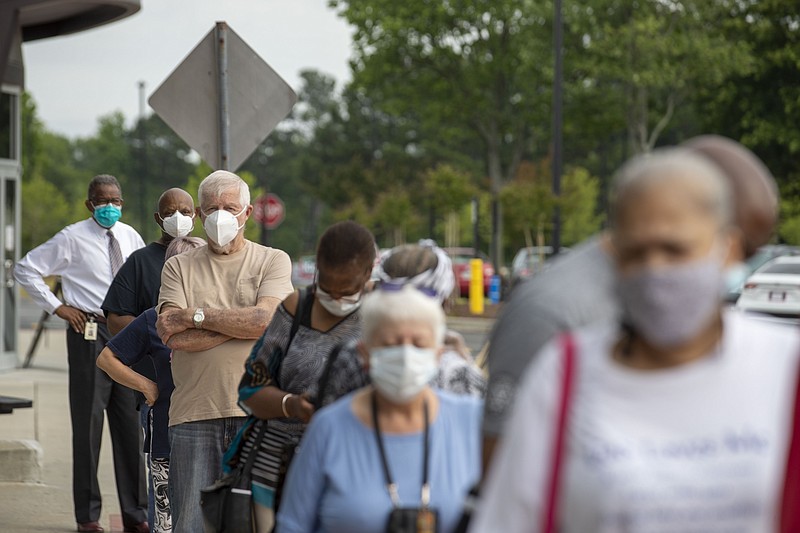The message at the top of the Tennessee State Government web page states "Do your part. Stay apart."
While it refers to Gov. Bill Lee's "trust" that Tennesseans will follow the "Tennessee Pledge" in reopening - meaning they will practice social distancing and stay home as much as possible, our state seems to have no interest whatsoever in helping us do that come Election Day.
If a voter is over 60, he or she is lucky because they are eligible to request online an absentee ballot from now until July 30 to vote in the Aug. 6 state and federal primary and the state and county general election. And to vote absentee in the General Election - the presidential election on Nov. 3 - they can again request an absentee ballot between Aug. 5 and Oct. 27.
But for the rest of the population, things are dicier. One must be a student or the spouse of a student attending school outside Hamilton County. Or be on jury duty. Or be physically disabled and their polling place inaccessible. Or be hospitalized, ill or the caretaker of a hospitalized, ill, or physically disabled person.
Q: How does a Tennessee voter request an absentee-by-mail ballot?
A: You must request a ballot in writing. The easiest was to do so is to use the online form at TN.gov (which must be printed, signed, and submitted) or call the office at 423/493-5100 and the state will send you an application.
A commercial driver working outside the county during early voting and on Election Day may apply for an absentee ballot, as can a candidate, an election official, a member of the military living overseas, or someone observing a religious holiday during the days of early voting and on Election Day.
A permanent illness absentee voter designation requires a doctor's certificate on file.
You get the idea: It's not easy - even in this dangerous coronavirus era - to get permission to vote without standing pretty close to scores of your closest unknown friends - some who may wear masks and some who you can be pretty certain probably will not.
Consider the 15% of Tennesseans who have diabetes and are more at risk from coronavirus than healthy folks. Obtaining that physician's statement that they are medically unable to vote in person - "filed not less than seven (7) days before the election and signed under the penalty of perjury" - requires a visit and payment to a licensed physician. Just to protect their individual right to vote without fear of injury or death. And diabetes is just one example.
It doesn't have to be this way.
Even Georgia is embracing vote by mail this year.
In a major push to encourage voting by mail during the coronavirus pandemic, Georgia Secretary of State Brad Raffensperger announced last month that all of Georgia's 6.9 million active voters would be mailed absentee ballot request forms for that state's primary.
As a matter of fact, Tennessee is now one of only five states that have yet to take action on this, forcing voters to choose between their health and exercising the fundamental right to vote. The other four states are Louisiana, Mississippi, Missouri and Texas.
A federal court ordered Texas to expand absentee ballots to everyone, but the matter is still being litigated.
Connecticut's governor just issued an executive order allowing all voters to obtain an absentee ballot for that state's primary election, circumventing a rule that, like ours, requires an excuse to vote by mail.
Like Tennessee, the hold-outs are red states. And they are some of the ones that have been the most reliably Trump-red states.
Speaking of Trump, you've likely heard that in recent days the president has become somewhat obsessed with the supposed dangers of people voting absentee. Never mind that it's how he has voted.
"We don't want them to do mail-in ballots because it's going to lead to total election fraud," Trump said Thursday. "So we don't want them to do mail-in ballots. We don't want anyone to do mail-in ballots."
He even threatened to "hold up funding" to Michigan and Nevada because those states are making it easier for people to vote from home in the midst of the pandemic. Michigan, following Georgia's example, is mailing everyone an absentee ballot application. Nevada is mailing everyone an absentee ballot.
Trump's claim that fraud is rampant in absentee voting is bogus. Absentee ballot fraud is exceedingly rare.
But his real motive - that he thinks mail voting advantages Democrats - is wrong, too. You might recall one of those rare instances of absentee voting fraud that made news last year. It was perpetrated by Republicans.
That may partly explain why even many Republican states are turning their backs on Trump and moving to expand mail voting. Georgia, Iowa, Nebraska and West Virginia are all states controlled by Republicans that Trump won in 2016. And they are all mailing absentee ballot applications to voters.
Did we mention that two-thirds of the national public supports allowing anyone to vote by mail if they want? Yes, Democrats are more likely to favor it, but about half of Republicans agree, despite the president's vocal opposition.
Tennessee is wasting valuable time to prepare for upcoming elections. Especially as our state's coronavirus cases continue to rise.
Keeping voters safe is not a partisan issue.
Open absentee voting to all.
